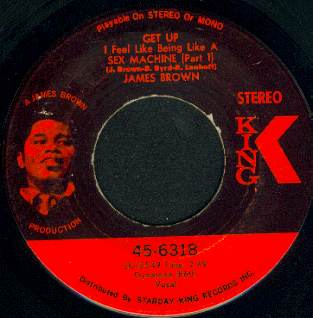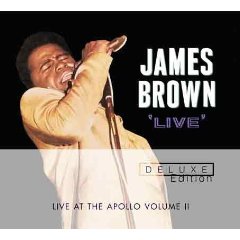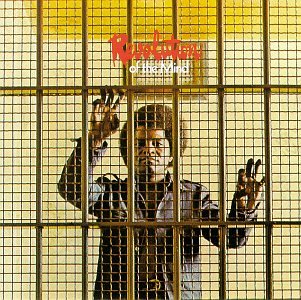Related Research Articles

Live at the Apollo is the first live album by James Brown and the Famous Flames, recorded at the Apollo Theater in Harlem in October 1962 and released in May 1963 by King Records. Capturing Brown's popular stage show for the first time on record, the album was a major commercial and critical success and cemented his status as a leading R&B star.

Star Time is a four-CD box set by American musician James Brown. Released in May 1991 by Polydor Records, its contents span most of the length of his career up to the time of its release, starting in 1956 with his first hit record, "Please, Please, Please", and ending with "Unity", his 1984 collaboration with Afrika Bambaataa. Writing in 2007, Robert Christgau described it as "the finest box set ever released... as essential a package as the biz has ever hawked, not just because it's James Brown, but because compilers Cliff White and Harry Weinger invested so much care and knowledge in it." Its title comes from the question Brown's announcer would ask concert audiences, as heard on the album Live at the Apollo: "Are you ready for star time?"

Sex Machine is a 1970 double album by James Brown. It showcases the playing of the original J.B.'s lineup featuring Bootsy and Catfish Collins, and includes an 11-minute rendition of the album's title song, different from the original recording of the title song which was released as a two-part single in 1970.

And in This Corner… is the third studio album released by MC/DJ duo DJ Jazzy Jeff & The Fresh Prince. The album was released in October 1989, reaching #39 on the US Billboard 200 albums chart. The album was not released on Compact Disc in the UK. However, it was available on this format in most of Europe.

All Day Music is the fourth album by American band War, released November 1971 on United Artists Records.

Funke, Funke Wisdom is the fourth solo studio album by American recording artist Kool Moe Dee from the Treacherous Three. It was released in 1991 via Jive Records, making it the rapper's final album on the label.

Joy of Cooking was an American music ensemble formed in 1967 in Berkeley, California. Associated with the hippie culture, the band's music combined rock & roll with folk, blues, and jazz. The band released three studio albums on Capitol Records in the early 1970s as well as a minor hit single in 1971, "Brownsville". Led by guitarist Terry Garthwaite and pianist Toni Brown, who both shared lead vocals, Joy of Cooking was a rare example of a rock band fronted by women.

"Get Up Sex Machine" is a funk song recorded by James Brown with Bobby Byrd on backing vocals. Released as a two-part single in 1970, it was a no. 2 R&B hit and reached no. 15 on the Billboard Hot 100.

"Mother Popcorn (You Got to Have a Mother for Me)" is a song recorded by James Brown and released as a two-part single in 1969. A #1 R&B and #11 Pop hit, it was the highest-charting of a series of recordings inspired by the popular dance the Popcorn which Brown made that year, including "The Popcorn", "Lowdown Popcorn", and "Let a Man Come In and Do the Popcorn". The "mother" of the song's title was, in the words of biographer RJ Smith, "[Brown's] honorific for a big butt".

"Make It Funky" is a jam session recorded by James Brown with The J.B.'s. It was released as a two-part single in 1971, which reached No. 1 on the U.S. R&B chart and No. 22 on the U.S. Pop chart.
"Talkin' Loud and Sayin' Nothing" is a funk song written by James Brown and Bobby Byrd. Recorded in 1970 by Brown and the original J.B.'s with Byrd on backing vocals and updated with a new melody, it was twice released as a two-part single in 1972. It also appeared on the album There It Is.

Live at the Apollo, Volume II is a 1968 live double album by James Brown and The Famous Flames, recorded in 1967 at the Apollo Theater in Harlem. It is a follow-up to Brown's 1963 recording, Live at the Apollo. It is best known for the long medley of "Let Yourself Go", "There Was a Time", and "I Feel All Right", followed by "Cold Sweat", which document the emergence of Brown's funk style. It peaked at #32 on the Billboard albums chart. Robert Christgau included the album in his "basic record library" for the 1950s and 1960s.

War Live is the first live album by American band War, recorded during a four-night engagement at Chicago's High Chapparral club and released as a double LP on United Artists Records in 1973. The album was reissued on Rhino Records as a double disc CD on 1992 September 15 and again on 2008 March 31.

Her Greatest Hits: Songs of Long Ago is the first official compilation album by Carole King. It was released in 1978 and features twelve songs that had previously appeared on her six studio albums for Ode Records released between 1971 and 1976. The album was re-released on CD/Cassette in 1999 with two additional tracks.
"I Can't Stand Myself (When You Touch Me)", also known as "I Can't Stand It", is a song written and recorded by James Brown in 1967. It is the most successful of the handful of recordings he made with The Dapps, a band of white musicians led by Beau Dollar. The single release of the song, which was sped up shifting the pitch up a half step/key, rose to #4 on the Billboard R&B chart and #28 on the Pop chart. The single's B-side, "There Was a Time", also charted.

Revolution of the Mind: Live at the Apollo, Volume III is a live double album by James Brown released in 1971. As its subtitle suggests, it is Brown's third album recorded at the Apollo Theater, following the original Live at the Apollo (1963) and Live at the Apollo, Volume II (1968).
"It's Too Funky in Here" is a song recorded by James Brown. Released as a single in May 1979, it charted #15 R&B. It also appeared on the album The Original Disco Man. Critic Robert Christgau praised the song as the "disco disc of the year".
"Kiss in 77" is a song written by Charles Sherrell and recorded by James Brown. Released as a single in 1977, it charted #35 R&B. It also appeared on the album Bodyheat. Robert Christgau gave the song a negative review, commenting sarcastically that it was "as 'brand new' as the 'New Sound!' [Brown] promises" on the jacket of its host album.
"Funk on Ah Roll" is a song written by James Brown and Derrick Monk and recorded by James Brown. It appears in three different versions on his 1998 album I'm Back, two of which are remixes. A number of additional remixes of the song, including a popular UK garage mix by Grant Nelson as Bump & Flex, were issued on 12" and CD in the United Kingdom in 1999, resulting in the song reaching No. 40 on the UK Singles Chart and No. 1 on the UK Dance Singles Chart. It did not chart in the United States.
"For Goodness Sakes, Look at Those Cakes" is a song written and performed by James Brown. Released as an edited two-part single in 1978, it charted #52 R&B in 1979. A full-length version appears on the album Take a Look at Those Cakes. Brown talks loudly and clearly in rhyme with only brief singing involved, this track being in part a precursor to the hip hop style which was yet to mount on record in a few years time. Robert Christgau described the song as "a great throwaway--an eleven-minute rumination on ass-watching, including genuinely tasteless suggestions that Ray Charles and Stevie Wonder join the fun."
References
- ↑ White, Cliff (1991). "Discography". In Star Time (pp. 54–59) [CD booklet]. New York: PolyGram Records.
- ↑ "CG: James Brown". Robert Christgau. Retrieved 2016-10-03.